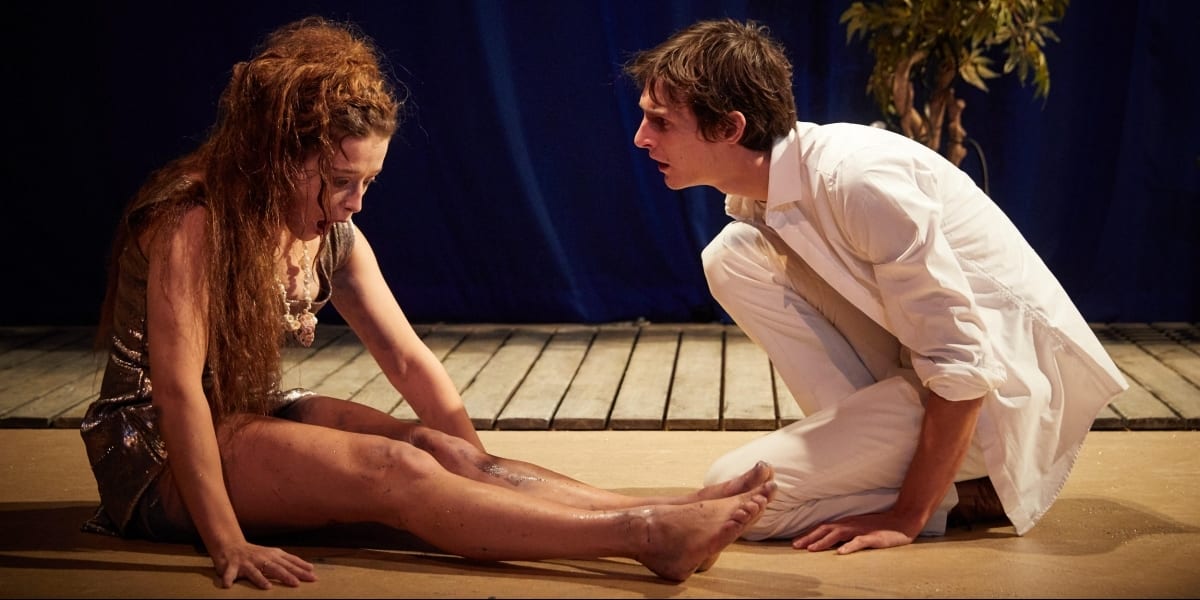The Little Mermaid, in its original pre-cartoon form, was written by the prolific Danish author Hans Christian Andersen who is best known for his fairy tales. We remember the stories from childhood yet, as we grow older, we realise that the themes that run through such tales transcend age and cultures. Géraldine Martineau’s adaptation of The Little Mermaid (La petite sirène) at the Comédie Française, offers a fusion of serious issues, such as cruelty and acceptance of oneself, as well as the fantasy element that is an integral part of every fairy tale.
The character of the little mermaid, exquisitely performed by Adeline d’Hermy, and her grandmother, Danièle Lebrun, both, sitting on separate swings, discuss the forthcoming 15th birthday of the little mermaid and the implications of her coming of age. The story follows that once she turns 15 she is permitted to surface and see the earth just so long as she is not seen! As fairy tale would have it, she saves a prince from drowning and falls in love with him. Thus, against all advice, she is determined to find him again – whatever the cost may be!
From the beginning you enter an enchanting world: the beautiful scenography made by Salma Bores presents the little mermaid and her grandmother sat on swings and around them, it seems, some glitter encrusted seaweed is floating! The costumes, made by Laurianne Scimemi Del Francia, are quite magical too as evidenced by the young mermaids who have their legs spangled to represent their tails. In this world apart, the sea creatures have their own language explored through mimicry, squeaks and gesture. Here, however, there is room for improvement; the actresses’ bodies could be much more fluid so as to capture their aquatic environment; their movements could be even lighter so as, perhaps, to imitate a form of dance.

If Géraldine Martineau’s staging is suitable for all audiences, it does not, on the other hand, prevent it from broaching with force and subtlety some deeper subjects. And indeed, like lots of tales assumed to be for children, The Little Mermaid approaches serious matters which affect both children and adults alike: disobedience, sacrifice, death, jealousy, feeling of strangeness and unconditional love. Adeline d’Hermy is stirring as a creature foreign to the human world, in particular when she loses her voice – one of the most intimate things actors and humans possess! Her remarkable interpretation, however, does not entirely exclude funnier and lighter moments when, for instance, she discovers her new legs and learns to walk like a baby. As for Jérôme Pouly (the prince’s father), he interprets a vulnerable and touching man behind his hearty-eater appearance and makes both young and old laugh.
You do not have to be a child to be touched by this universal narrative. It seems to me that too few such tales are adapted for the stage (with the notable exception of Joël Pommerat’s work), despite their relevance today. I eagerly await Géraldine Martineau’s next take on another tale.
SUMMARY IN FRENCH
Dans sa mise en scène de La petite sirène à la Comédie-Française, Géraldine Martineau a fait appel à la scénographe Salma Bores qui y réalise de magnifiques décors, notamment pour figurer l’univers aquatique (amateurs de paillettes, foncez !). Mais derrière ce monde apparemment enchanté, la tragédie de la « petite » créature des mers se met rapidement en place. Pour sa première mise en scène tout public, Géraldine Martineau traite avec subtilité les enjeux de ce récit bouleversant. On attend avec impatience qu’elle s’empare d’un nouveau conte.

